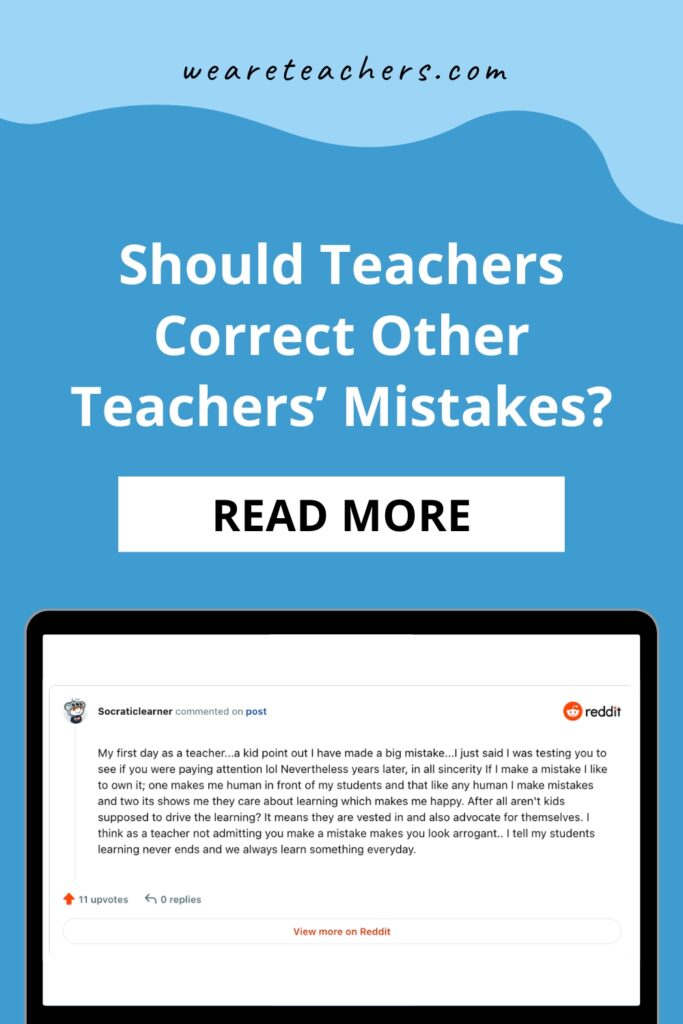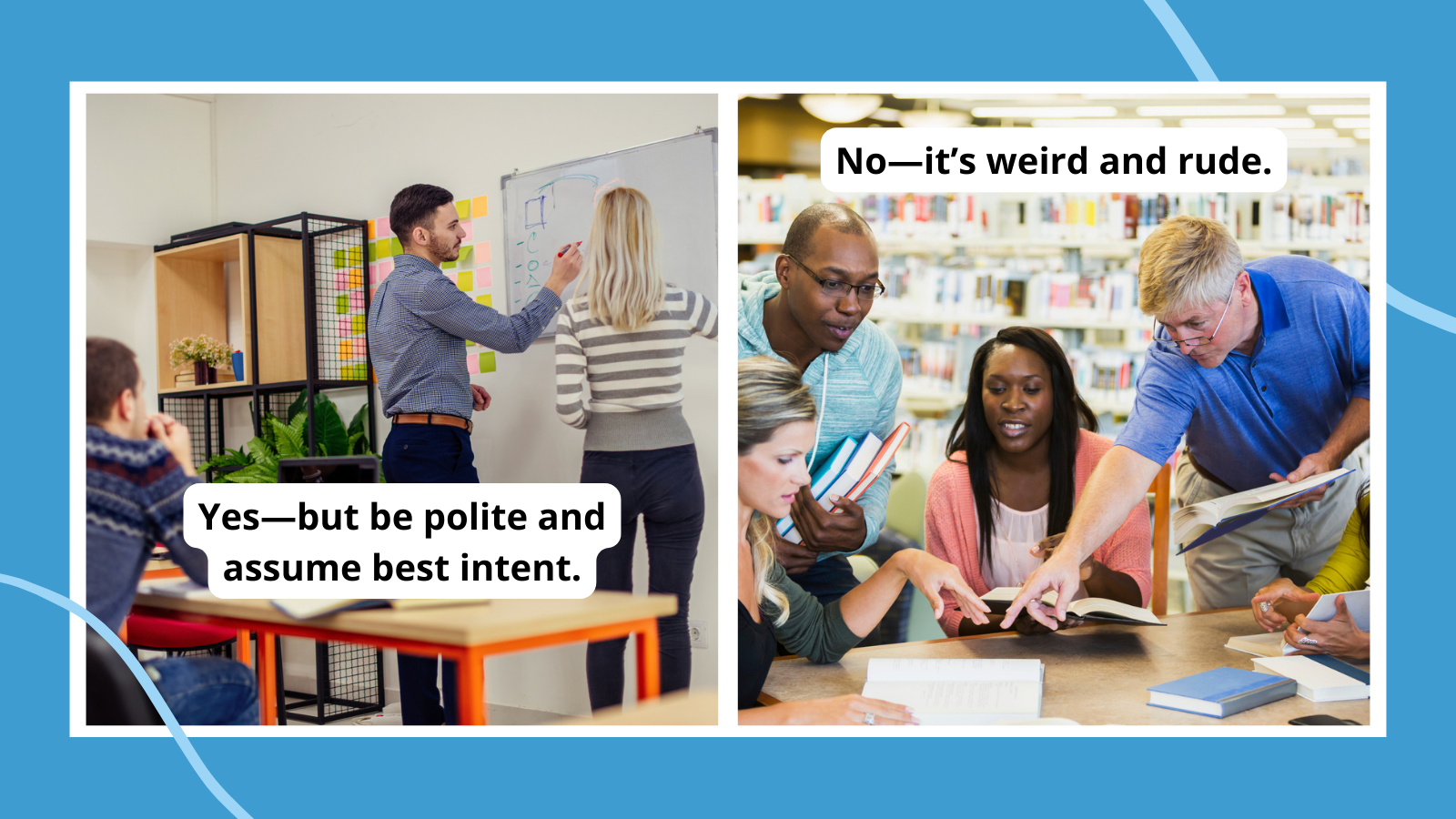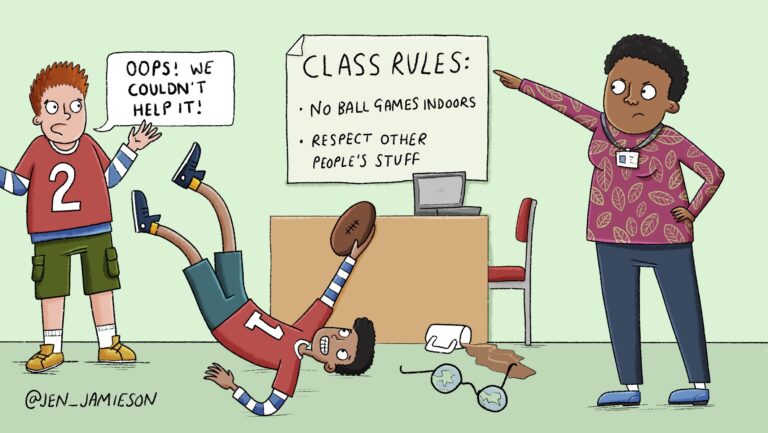I had the pleasant experience of student-teaching a calculus class.
Yeah, I KNOW.
One day, I observed my mentor teacher delivering a lesson on a challenging topic. Something caught my attention—he was working through the steps and lesson incorrectly. I was just 21 years old at the time, and I couldn’t decide if I should speak up and correct another teacher’s mistake (yikes!) or let it slide. Ultimately, I decided to keep quiet.
Fast-forward several years, and I found myself in an 8th grade math teaching role, tutoring a 7th grade math student. We were working with the percent change formula … incorrectly. You know how I found out? The other math tutor heard what I was saying and kindly corrected me with, “You know Mrs. Morris, I think the formula might work better if you approach it similarly to how I taught it this morning. Do you see what I mean?” I didn’t hesitate for a moment. Overflowing with gratitude, I exclaimed, “OH MY GOODNESS! Thank you for correcting me!”
Had I used the percent change formula correctly in high school? Absolutely. Had I made an error due to a lack of recent practice? Absolutely. In that moment, my pride took a backseat to ensuring the student grasped the current information.
As it turns out, being in a position of having to correct another teacher’s mistake is a far more common occurrence than I imagined. Take this Reddit post involving a teacher-parent who teaches high school science and has a son in middle school science.
The project in question
“Last night he was working on a project and asks me what a lysosome in a plant cells looks like. I side eye because I just got done teaching my classes that lysosomes are found in animal cells, not plant cells. He then says, ‘I tried to search it but online it says plant cells don’t have lysosomes.’ I tell him that’s true and to double check his directions, assuming that he’s being a 12-year-old boy and can’t read.
“Nope, his assignment specifically tells him to include a lysosome in his plant cell.
“This is actively inaccurate, which is annoying and likely actively creating issues for students in future classes.
“So, now I want to talk to his teacher about it but I don’t want to be obnoxious about it. I can’t think of a non-confrontational way to bring it up and I don’t want to create drama within our system.
“Thoughts?”
While the OP (original poster) of this Reddit comment was probably just looking for practical advice on their specific situation, the comment section quickly turned into a bigger-picture discussion of ethics, best practices, and teacher etiquette.
Many teachers took the affirmative angle.
Yes, teachers should absolutely correct another teacher’s mistake
Send a brief email, and assume best intent
I like that this one gives teachers the benefit of the doubt. And how many of us are super happy about lecture emails?! Not me!
Admitting to mistakes keeps us humble and human
I love this take! This teacher probably has a great classroom environment. Made a mistake? Not a problem! We don’t know everything.
Everyone needs a good editor!
If a teacher has slipped on content, it could just be an oops moment! No biggie!
Yes, because students might not correct their teacher
Students probably don’t want to address a mistake by a teacher; this is an absolute real concern. So yes, maybe as the fellow adult, it is appropriate to correct the teacher because some students will never correct them!
Approach it as a question
In a perfect world, all teachers would handle critiques with grace, but another adult might have to be prepared to step in!
Establish common ground
Maybe if you correct another teacher’s mistake by connecting through your common ground, it’ll help ease over the awkwardness.
The golden rule
Yes! I was hoping someone would comment how I felt in that tutoring session many years ago. PLEASE correct me so I don’t continue to give wrong information!
Other teachers said no way—not worth it!
No—teachers should not correct another teacher’s mistake
Let it go—it’s a typo
Maybe before considering correcting another teacher, you consider the weight of the mistake. If it’s just a typo in a worksheet … eh! Maybe we shouldn’t correct the teacher.
It could blow up 🫣
This double-down, smack-down doesn’t really feel worth it, does it?
Son should self-advocate
This suggestion removes the awkward teacher-on-teacher situation, yet it still gets addressed. Nice!
Questions from students show they’re learning
If a fellow teacher remains out of the conversation and allows the student to address the oops, this can allow for engagement in the classroom. Isn’t that what we all want anyway?
Extra-credit typos!
Maybe teachers shouldn’t correct teachers on a mistake … because it could turn out it’s a learning opportunity that was done on purpose? Maybe!
So, what’s your take on this dilemma? It’s clear that there are valid arguments on both sides of the debate. While it might not have been appropriate for me to interrupt my mentor teacher’s lesson, perhaps there were more tactful ways for him to learn the correct approach to that calculus problem. Nevertheless, these teachers have different ideas on how to handle the other teacher’s mistake or typo, but one thing they agree on is the importance of maintaining professionalism and respect.
But as I wrap up another post, aren’t I ending how I always end? We always circle back to this same fundamental principle: We can set aside our egos and do what is best for kids.
Looking for more articles like this? Be sure to subscribe to our newsletters!


